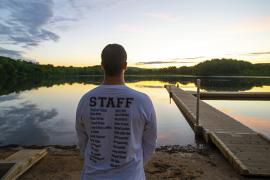Research is more than surveys, interviews, and statistics — it can be a valuable tool to use when designing camp programs, training staff, or in your marketing efforts. But it's also a critical tool for understanding how camp fits into the lives of today's youth. Research suggests that growing up in 2018 can be confusing, difficult, and complex, which means that kids need places where they can experience a different way of being. Summer camps might be the place. Here are findings of three research studies that you can use to make sure your camp is a place apart.
Sense of Community among Staff
We know from existing summer camp research that a sense of community and belonging is one of the most important parts of the camp experience (Sibthorp, Bialeschki, Morgan, & Browne, 2013). When kids feel a strong sense of community and belonging, they feel better able to establish camp as a place apart from everyday life, and they are more likely to explore new identities and different ways of being while at camp (Baker, 2018). But what about camp counselors — how do they experience camp as a place apart?
In a recent study, Baker (2018) looked at the positive and negative experiences of working at camp. She found that counselors often have similar experiences to that of campers, which suggests that counselors experience camp as a unique place apart too. Participants in this study said the unique social norms provided a platform for developing more meaningful relationships with their peers; however, they also described how the social norms at camp can lead to intensified desires to fit in and feelings of social pressure. Adding to this, according to Baker, are the new roles camp staff take on at camp and the fact that staff are responsible for campers' safety and fun. Camp counselors may indeed experience camp as a place apart, and this can be a very good thing, but it can also lead to feelings of isolation and burnout.
How Can You Use This Research At Camp?
This study makes it clear that camps need to support staff in many of the same ways they support campers. This need is of particular importance considering counselors' role with maintaining the overall camp atmosphere and social norms, as well as their ability to facilitate youths' camp experiences. Baker (2018) suggests:
- Intentionally foster camp counselors' sense of community and belonging at camp through practices, rituals, and traditions.
- Offer shorter employment contracts to provide counselors an opportunity to rest and recharge.
- Introduce practices or policies that provide counselors with opportunities to process the meaning of their experiences.
Smartphones at Camp?
Technology seems to be advancing exponentially, and keeping up with the newest and most popular gadgets, apps, and social media adds another layer of stress and anxiety to our lives. Now imagine being a kid bombarded with the social pressures they experience through these gadgets, apps, and social media. How does camp fit in? Imagine being plucked from this wired and plugged-in world and implanted in a place that likely has no technology at all. Summer camps may be the one place in youths' lives that they have the opportunity to leave the craziness of technology behind and just be kids.
A recent study conducted by University of Michigan researchers (Mostafavi, 2018) investigated the role of technology, specifically smartphones, at summer camp. Through a survey of 620 camp directors, nurses, and other staff from 331 camps across the United States and Canada, the researchers found that smartphones play a variety of roles at some camps. Study participants reported that allowing camp staff to use smartphones made taking photos easier and helped staff stay connected to one another. However, participants also reported that smartphones, and their easy access to social media, seemed to discourage less confident campers from participating in more socially risky activities (e.g., skits and talent shows). In other instances, staff reported that phones distracted campers, which resulted in accidents and concerns of cyberbullying.
How Can You Use This Research At Camp?
The summer camp experience as a place apart positions it as an opportunity for disconnecting from technology and experiencing a different way of being. Sorting out smartphones' role at summer camp needs to be addressed. Here are some things to think about:
- The researchers found that 60 percent of the respondents said their camp had a specific policy about smartphone use, which should be a subtle reminder that you aren't alone — camps across the country are wrestling with how to best manage smartphone use as well.
- Given the potential consequences of smartphones at camp, sorting out the “to allow or not to allow smartphones” dilemma is worth pondering. What are your camp's policies regarding camper and/or staff use of smartphones? Have you noticed negative consequences of their use at your camp?
- Smartphones are often positioned as a convenient way for campers to stay connected with their families (Mostafavi, 2018). Is this a good thing and, if not, how should campers' experiences be shared with their families so that parents and caretakers feel informed and less anxious in our digitally connected world?
A Place to Practice
Youth engage in a variety of experiences throughout their lives that provide opportunities to feel success and failure. Whether through school, athletics, or other competitive activities, youth are consistently provided with feedback regarding their performance. Developing the ability to manage their emotions will benefit youth as they mature and engage in other pursuits. Summer camp may be an important place for youth to try new activities and experience a different way of being. As a result, understanding camp's role as a place apart in the development of evaluating and learning from success and failure is crucial.
Wilson and Sibthorp (2017) sought to better understand campers' experiences of success and failure at camp. Through interviews with 32 youth from camps in the western United States, the researchers explored how campers experienced success and failure while at camp, whether they felt positively or negatively about these experiences, and their actions after success of failure. The findings suggest that youth campers experienced success and failure through activity or social experiences, and their responses to success and failure were related to camp staff and the overall camp environment.
How Can You Use This Research At Camp?
The findings of this study suggest that the experience of success and failure is another way summer camp may be the place apart that youth need today. Here are some of the researchers' suggestions:
- Encourage campers to embrace challenges and try new things, as camp is an excellent opportunity to make mistakes and experience failure without long-term, negative consequences.
- Train staff specifically how to support campers through experiences of success and failure — this starts by building positive rapport with campers so they feel safe to try new things.
- Engage campers in planning and reflection around success and failure. Goal setting is a great way to do this, but be sure to leave time and space for campers to discuss how they feel when they are successful or not.
The Takeaway
These studies provide valuable insight into the numerous ways that summer camps may be an opportunity to experience a world novel to our everyday lives. By connecting research to practice, studies such as these highlight meaningful and useful trends occurring across the summer camp industry that may help to establish camp's role as a place apart.
References
- Baker, M. (2018). Welcome to the bubble: Experiences of liminality and communitas among summer camp counsellors. Journal of Youth Development, 13(1–2), 24–43. doi: 10.5195/jyd.2018.565
- Mostafavi, B. (2018). Cellphones at summer camp: Research explores the effects. Retrieved from labblog.uofmhealth.org/rounds/cellphones-atsummer- camp-research-explores-effects
- Sibthorp, J., Bialeschki, M.D., Morgan, C., & Browne, L. (2013). Validating, norming, and utility of a youth outcomes battery for recreation programs and camps. Journal of Leisure Research, 45(4), 514–536.
- Wilson, C., & Sibthorp, J. (2017). The developmental importance of success and failure experiences at summer camp. Journal of Youth Development, 12(3), 18–36. doi: 10.5195/jyd.2017.502
Rob Warner, a research assistant for ACA, is a doctoral student at the University of Utah and has worked in the youth development field for a variety of organizations as a counselor, field instructor, and mentor.


